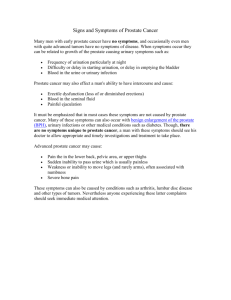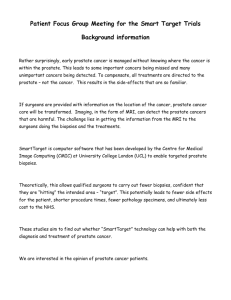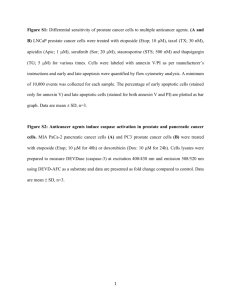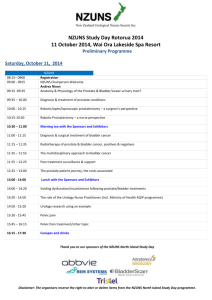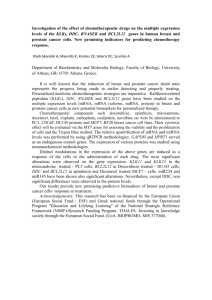Men and the BRCA gene Is there a need to be
advertisement
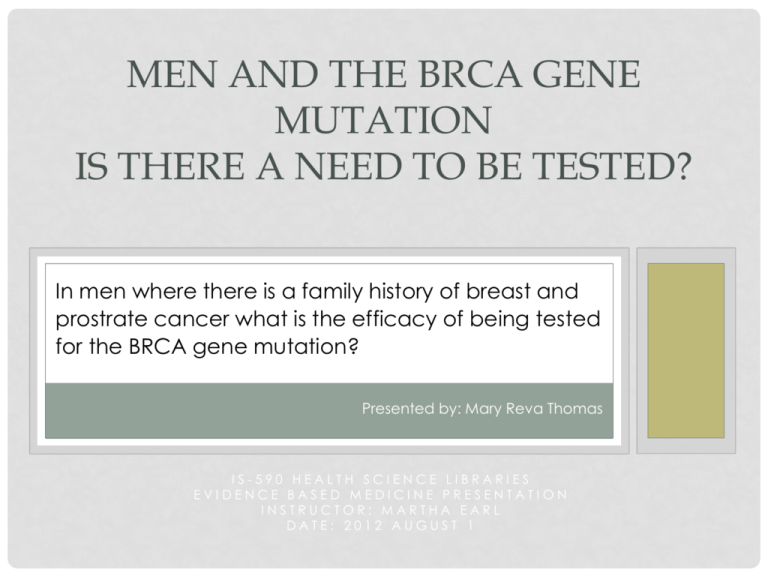
MEN AND THE BRCA GENE MUTATION IS THERE A NEED TO BE TESTED? In men where there is a family history of breast and prostrate cancer what is the efficacy of being tested for the BRCA gene mutation? Presented by: Mary Reva Thomas IS-590 HEALTH SCIENCE LIBRARIES EVIDENCE BASED MEDICINE PRESENTATION INSTRUCTOR: MARTHA EARL DATE: 2012 AUGUST 1 - PATIENT QUESTION – ASSESS THE PATIENT • John is 55 years old, is overweight and has high blood pressure. He has just been diagnosed with stage 1 prostrate cancer. • An aunt died of breast cancer, his mother and a cousin are breast cancer survivors and his uncle died of prostate cancer at 75 years of age. • Because of his job as a faculty member in the biology department he realizes he knows enough to be dangerous. Understanding the link between breast cancer and prostate cancer he is wondering if he should have a BRCA test performed to aid in his treatment options and decisions. - PICO - CLINICAL QUESTION PICO Clinical Question Patient or problem Stage 1 Prostate Cancer Middle aged male Intervention/prognostic BRCA test Comparison none Outcomes Primary: aid in treatment choices Secondary: prolong life • For a middle-aged man with stage 1 Prostate Cancer, is the BRCA test useful in determining treatment options? • This is a prognosis question for the patient. The best evidence would be a cohort study if there are enough studies, a systematic review might be useful. - PRESENTATION GOALS • BRCA1 and BRACA2 gene mutations, in families that have a high incidences of breast, ovarian and prostate cancer; the BRCA test becomes a useful tool in determining treatment options not only for women but for men as well. • The BRCA test in young men (<40) appears to be most effective once a diagnosis has been made for prostate cancer. While rare, and not talked about, men get breast cancer. The BRCA test could be useful for these men with high risk factors. • Research is not conclusive. More research needs to be done especially in relation to men and the BRCA mutation. - PROSTATE CANCER - - PROSTATE CANCER – OVERVIEW • Definition • The prostate is a walnut-sized gland in the male reproductive system; found below the bladder and in front of the rectum; it surrounds the urethra and makes a fluid that is part of semen. Cancer occurs when prostatic epithelial cells divide without control or order. Normally, cells divide in a regulated manner. If cells divide uncontrollably, when new cells are not needed, a mass of tissue or tumor forms. Malignant tumors can metastasize or invade nearby tissue and spread to other parts of the body. Benign tumors do not spread to other parts of the body. (Lexicomp) • Prostate cancer usually occurs in older men. (NCI) - PROSTATE CANCER – OVERVIEW • Statistics (NCI and ACS) • Estimated new cases and deaths from prostate cancer in the United States in 2012: New cases: 241,740 Deaths: 28,170 (NCI) • About 1 in 6 men will be diagnosed with prostate cancer • 2/3 of prostate cancers diagnosed in men >65 years old • Rare before age 40 • Average age of diagnosis: 67 • 1 in 36 will die of prostrate cancer (ACS) • Second most common cancer in men • Second leading cause of cancer death in USA • Sixth leading cause of cancer death world wide - PROSTATE CANCER – OVERVIEW Statistics con’t • Survival Rates: • Used as a way of discussing a patient’s prognosis • Relative survival rate - number of years since treatment • 5 year: 100% • 10 year: 98% • 15 year: 91% • Survival Rate by NCI stage(AJCC stage): • Local Stage (Stage I & II): nearly 100% • Regional (Stage III & IV- not spread to distant part of body): nearly 100% • Distant (Stage IV- all the rest): 29% - PROSTATE CANCER – OVERVIEW Statistics con’t • Death Rates by race and age in the US Race All Ages Age < 65 Age 65+ All Races 23.58 1.79 174.18 Whites 21.72 1.52 161.36 Blacks 53.10 4.81 386.68 Numbers in 100,000 Excerpt from NCI Table • In the USA - less common in Asian/Pacific Islander, Native Americans/Alaska Natives • Rates of detection vary world-wide • Highest in North America and Western European countries • Lowest in Africa - PROSTATE CANCER – OVERVIEW • Risk factors ACS (2012), NCI and DynaMed(last update 2012) ACS Age >65 Race Family history Genetics Diet Obesity Smoking Inflammation of Prostate ✔ ✔ ✔ ✔ Not clear Not clear *** Needs more research NCI ✔ ✔ ✔ ✔** DynaMed ✔ ✔ ✓ ✓ * PIN: prostatic intraepithelial neoplasia ** mutation in the BRCA1/2 ***small increases in mortality among smokers Needs more research ✓ ✔ PIN* Not clear - PROSTATE CANCER – OVERVIEW • Epidemiology (DynaMed, ACS, NCI) • Age: • disease of the elderly, over age 65. It is rare in men under 45 • Endocrine: • androden-receptor (AR)-mutation • Diet & Obesity: • Exact role of diet is unclear. Several lines of clinical and experimental evidence support a central role for diet, caloric intake, and obesity in the development of prostate cancer with lethal potential. Obesity is not currently considered a risk factor • Race & Ethnicity: • African Americans have a higher frequency of death from prostate cancer compared to Caucasian and Hispanic Americans. • Family History/Genetic Predisposition: • Higher risk if a first degree relative had prostate cancer. As with breast and colon cancer, familial clustering of prostate cancer has been reported. Men carrying BRCA1/BRCA2 mutations have been shown to be at increased risk of developing prostate cancer. - PROSTATE CANCER – OVERVIEW • Economic impact (ACS, NCI, and Stokes 2011) • Cost of Screening • (Digital exam, PSA, biopsy/Gleeson Score) • Cost of Treatment • (watchful waiting/radiation/ surgery) • Cost of Follow up • Stage at which treatment started and life expectancy • Funding for research • Uninsured costs • Annual cost for treatment (Stokes 2011) • 2006 USA: $9.862 billion dollars • 2004 USA: $4.0 billion dollars • 2004 USA life-time cost for individual: $34,432 • 2004 USA costs per year for individual: $2,608 - PROSTATE CANCER – OVERVIEW • Etiology/Causes • Not sure exactly what causes prostate cancer multifactorial • Basic: prostate cancer is caused by changes in the DNA of prostate epithelial cells • about 5% to 10% of prostate cancers are linked to inherited DNA changes (ACS) • Arises from peripheral acinar glands (DynaMed) - PROSTATE CANCER – OVERVIEW • Diagnosis (Pienta 2012) • Problem: most men are asymptomatic • Digital Rectal Exam, abnormal • PSA screening, elevated – has false positives • Treatments (Pienta 2012) • Variety of factors to consider • • • • • Remaining life expectancy Additional life threatening issues Quality of life Treatment preferences Risk factors • Biopsy: histological, (+)used to determine Gleeson Score • Watchful Waiting • Molecular markers • Active surveillance (regular monitoring) • Most men (67%) will die from other causes • PSA, DRE on a specific time frame • Local Therapy • Surgery, Radiation, Brachytherapy • Hormone Therapy • Not a cure - PROSTATE CANCER – OVERVIEW • Alternative Treatments • No specific alternatives for Prostate Cancer • Integrative oncology counseling • General Alternative Treatments could include: • Complementary to medical treatments • Select those where the benefits outweigh the risks • Quality of Life Issues • Psychological Issues related to diagnosis and treatment options • Depression / Psychological distress • Fears: • Sexuality / no sex life (surgery) • Urinary Incontinence & Bowel Changes (surgery) • Hormonal changes (use of hormone therapy) • Physical Aspects • Coping with Pain (bone metastases) • Fatigue - BRCA1/BRCA2 OVERVIEW • Key points: (NCI) • BRCA1 & 2 are tumor suppressor genes; everyone has them; they promote normal cell growth • BRCA1 & 2 mutations are linked to inherited cancers; mutations are inherited in a dominant manner; having a mutation does not mean one will get cancer however • Genetic Tests are available to check for mutations • Cost range for test: several hundred to several thousand dollars • If a mutation is found there are options to manage cancer risk • Federal and state laws protect a person’s privacy • Research is continuing to be done in BRCA1/BRCA2 mutation carriers • • • • • Detection Treatment Prevention Genetic counseling An evolving area - BRCA1/2 MUTATIONOVERVIEW • Mutations can be: • Harmful, neutral or beneficial • Things to remember about harmful BRA1/2 mutations and family cancers (NCI): • Likelihood cancers associated with BRCA1/2 mutations is highest in families with history of multiple cancers • Not everyone in these families carries the harmful mutation • Not every cancer in these families is linked to the harmful mutation • Not everyone with the harmful mutation will develop cancer • General population (USA) (DynaMed) • 0.2% - 0.33% have BRCA1or 2 mutations • Accounts for 5%-10% of breast cancer in women • Accounts for 10%-15% of ovarian cancer in white women • BRCA1 mutation • Useful only if there is a family history of ovarian or multiple breast cancers • Prevalent in women in certain race/ethnic groups - BRCA1/2 MUTATIONOVERVIEW • BRCA1 & 2 mutations (Jensen 2010) • Linked to the following cancers: • • • • • Breast Ovarian Pancreas Stomach Prostate • There are hundreds of mutations associated with BRCA1 & 2 • Some mutations increase cancer risk • Others are unknown and need more research • As the consequences of these mutations are described it is believed that better cancer treatments will be found - BRCA1/2 MUTATIONAND MEN • Men with BRCA1/BRCA2 mutations (NCI) • BRCA1 mutation - increased chance of: • Breast Cancer • Pancreatic Cancer, possibly • BRCA2 mutation – may be associated with an increase of: • • • • Breast Cancer Pancreatic Cancer Testicular Cancer Early onset Prostate Cancer • Individual Studies (DynaMed): • BRCA2 mutation may be associated with increased risks for cancer prostate, pancreatic, gallbladder and bile duct, stomach and malignant melanoma • Men with family history of: • Breast (male or female) and ovarian cancer • Any breast cancer diagnosed before age 50 • Men diagnosed with prostate cancer with high-risk family history - PRIMARY SOURCE - RANDOMIZED CONTROL TRIAL • Agalliu I. Germline mutation in BRCA2 gene and susceptibility to hereditary prostate cancer. Clinical Cancer Research 2007;13(3):839-843 http://www.ncbi.nlm.nih.gov/pubmed/17289875 Accessed July 29, 2012. • PMID: 17289875 [PubMed - indexed for MEDLINE] - SEARCH STRATEGY MESH HEADINGS • Key Words from patient question: Patient question MeSH heading Prostate Cancer Prostatic Neoplasms BRCA gene Genes, BRCA1 Genes, BRCA2 male male BRCA test No term Gene test Genetic testing Mutation mutation - EBM WORKSHEET VALID • Was a defined, representative sample of patients assembled at a common point in the course of their disease? • 266 subjects from 194 Hereditary Prostate Cancer (HPC) families • Seattle-based Prostate Cancer Genetic Research Study • Screened for BRCA2 mutation • HPC families – 32 had multiple cancers (breast, ovarian) • HPC families – 16 were Jewish • HPC families – 8 had pancreatic cancer • HPC families – 138 had at least one affected man diagnosed with prostate cancer • Was patient follow-up sufficiently long and complete? • No • Study was descriptive - EBM WORKSHEET VALID • Were objective outcome criteria applied in a “blind” fashion? • No, Study was descriptive • Detailed family histories were taken • If subgroups with different prognoses are identified, was there adjustment for important prognostic factors? • Various high risk families were identified within the HPC families selected • Each subgroup’s data was recorded and analyzed • There were overlaps in risk factors in families • Was there validation in an independent group of patients? • Compared to HPC men diagnosed at an early age - EBM WORKSHEET VALID • How likely are the outcomes over time? • Population sample was small • Did not compare to non-HPC families • Study was in response to prior studies indicating an increased risk of early prostate cancer and the BRCA2 gene mutation. • No intention of following the HCP subjects • Was patient follow-up sufficiently long and complete? • No • Descriptive data was sufficient and complete - EBM WORKSHEET PATIENT CARE • Were the study patients similar to your own? • Similar – member of a HPC family • Similar – multiple breast cancers in family • Similar – one family member with prostate cancer • Not similar – not a first degree relative • Will this evidence make a clinically important impact on your conclusions about what to offer or tell your patient? • From this study the recommendation would be that getting tested for the BRCA2 gene mutation, at the patient’s age (55) would not offer any benefit in choosing treatment options. - EBM WORKSHEET CAVEAT • In a different study with a 33 month follow-up: men with high PSA values and either the BRCA1 or BRCA2 mutation showed, cancer on biopsy. • Mitra AV, Bancroft EK…Targeted prostate cancer screening in men with mutation in BRCA1 and BRCA2 detects aggressive prostatic cancer: preliminary analysis of the results of the IMPACT study BJU International 2011 107(1):28-39 http://ncbi.nlm.nih.gov/pubmed/20840664 Accessed July 27, 2012 • This and other research would indicate for a young man (<40 years) diagnosed with prostate cancer - might want to screen for the BRCA1or 2 mutation - to determine how aggressive to treat the cancer. This may be the only group where screening could impact mortality. • More research is needed. Within the last 5 years there are conflicting studies. - SECONDARY SOURCES - COCHRANE/ CINAHL/CRITICALLY APPRAISED TOPICS • Cochrane • No data on Prostate Cancer and BRCA screening • CINAHL • Guttman C. Link found between BRCA mutations, advanced Pca:finding suggest that DNA testing in early-stage patients could help guide management. Urology Times, 2009 Apr 15; 37 (5): 19-20 ISSN: 0093-9722 CINAHL AN: 2010267987 Accessed July 29, 2012 • Article also acknowledges that more research is needed. • Tryggvadóttir L; Vidarsdóttir L; Thorgeirsson T; Jonasson JG; Ólafsdóttir EJ; Ólafsdóttir H; Rafnar T; Thorlacius S; Jonsson E; Eyfjord JE; et al Prostate cancer progression and survival in BRCA2 mutation carriers. Journal of the National Cancer Institute, 2007 Jun 20; 99 (12): 929-35 (journal article - research) ISSN: 0027-8874 PMID: 17565157 CINAHL AN: 2009614225 Accessed July 29, 2012 - WHAT THE EXPERTS SAY – DYNAMED, MDCONSULT • DynaMed • Prostate cancer screening • No mention of BRCA1/BRCA2 screening • MD Consult • Abeloff:Abeloff’s Clinical Oncology 4th ed (2008) • BRCA1/BRCA2 screening for breast and ovarian cancer in patience that have significant family history, no mention for men. • Gallagher DJ. Germline BRCA mutation denote a clinicopathologic subset of prostate cancer Clinical Cancer Research 2010 16(7) 2115- 2121http://www.mdconsult.com.ezproxy.etsu.edu:2048/das/citation/body/3477 685615/jorg=journal&source=MI&sp=23196096&sid=1337224061/N/23196096/1.html?iss n=1078-0432 Accessed July 29, 2012 • BRCA2 gene mutation had a greater risk on prostate cancer; BRCA1 mutation did not indicate any risk for prostate cancer - THE ANSWER IS…- Ambiguous & Depends... • On the man’s age at onset / detection • Family risk factors • The BRCA test would be useful for a young man (<40) with a family history of breast, ovarian and prostate cancer • More research needs to be done to eliminate some of the ambiguities in the current reseach. - CONSUMER WEB SITES/ SOURCES • WebMD • Prostate cancer: • http://www.webmd.com/search/search_results/default.aspx?q uery=prostate%20cancer • BRCA gene: • http://www.webmd.com/search/search_results/default.aspx?q uery=BRCA%20gene • BRCA gene and men • http://www.webmd.com/search/search_results/default.aspx?q uery=BRCA%20gene%20and%20men - CONSUMER WEB SITES/ SOURCES • MedicinNet.com • Prostate cancer • http://search.medicinenet.com/search/search_results/default.a spx?Searchwhat=1&query=prostrate+cancer&I1=Search • BRCA gene • http://search.medicinenet.com/search/search_results/default.a spx?Searchwhat=1&query=brca+gene&I1=Search • BRCA gene and men • http://search.medicinenet.com/search/search_results/default.a spx?Searchwhat=1&query=brca+gene+and+men&I1=Search - SUPPORT GROUP • Us Too prostate cancer education and support • http://www.ustoo.org/Default.asp • A local support group in Kingsport TN • MDJunction • http://www.mdjunction.com/prostate-cancer • Online support group • Disscussion groups BIBLIOGRAPHY • Prostate Cancer Oveview • Lexicomp(2011 Sept.) Prostate Cancer:Lexi-Patient Education – Disease and Procedure http://online.lexi.com.prospero.mc.utmck.edu:2048/lco/action/doc/retrieve/docid/hpals/377606 Accessed July 28, 2012. • National Cancer Institute (n.d.) NCI Dictionary of Cancer Terms http://www.cancer.gov/dictionary?CdrID=445079 Accessed July 28, 2012. • Mayo Clinic Staff (updated 2012 May 24) Prostate Cancer: Definition http://www.mayoclinic.com/health/prostate-cancer/DS00043/ Accessed July 28, 2012. • Corn P, Logothetis C. Chapter 34. Prostate Cancer. In: Kantarjian HM, Wolff RA, Koller CA, eds. The MD Anderson Manual of Medical Oncology. 2nd ed. New York: McGraw-Hill; 2011. http://www.accessmedicine.com/content.aspx?aID=8311397Accessed July 28, 2012. • American Cancer Society Prostate Cancer: What are the Statistics about Prostate Cancer? Last review February 27, 2012 http://www.cancer.org/Cancer/ProstateCancer/DetailedGuide/prostate-cancer-keystatistics Accessed July 28, 2012 • American Cancer Society, Prostate Cancer: Survival Rates for Prostate Cancer. Last reviewed February 27, 2012 http://www.cancer.org/Cancer/ProstateCancer/DetailedGuide/prostate-cancer-survival-rates Accessed July 28, 2012 • DynaMed Prostate Cancer: Causes and Risk Factors Las update June 26, 2012 http://web.ebscohost.com.ezproxy.etsu.edu:2048/dynamed/detail?vid=3&hid=104&sid=2075cf5b-d6d6-40f09aadfcb81abbbc32%40sessionmgr111&bdata=JnNpdGU9ZHluYW1lZC1saXZlJnNjb3BlPXNpdGU%3d#db=dme&AN= 114483 Accessed July 28, 2012 • National Cancer Institue What you need to Know About Prostate Cancer; Risk Factors (n. d.) http://www.cancer.gov/cancertopics/wyntk/prostate/page4 Accessed July 28, 2012 BIBLIOGRAPHY • Prostate Cancer Overview con’t • National Cancer Institue What you need to Know About Prostate Cancer; Risk Factors (n. d.) http://www.cancer.gov/cancertopics/wyntk/prostate/page4 Accessed July 28, 2012 • American Cancer Society Learn About Cancer: Prostate Cancer What are the Risk Factors for Prostate Cancer? (Last Updated February 27, 2012) http://www.cancer.org/Cancer/ProstateCancer/DetailedGuide/prostate-cancer-riskfactors Accessed July 28,2012 • Roehrborn, C. G. and Black, L. K. (2011), The economic burden of prostate cancer. BJU International, 108: 806–813. doi: 10.1111/j.1464-410X.2011.10365.x http://onlinelibrary.wiley.com.ezproxy.etsu.edu:2048/doi/10.1111/j.1464410X.2011.10365.x/abstract Accessed July 29, 2012 • Stokes, MD, Ishak J, Proskorovsky I, Black LK, Huang Y Lifetime Economic Burden of Prostate Cancer BMC Health Services Research 2011 11:349 published on line Dec 28 2011doi: 101186/1472-6963-11-349 PMCID: PMC3276437 http://www.ncbi.nlm.nih.gov/pmc/articles/PMC3276437/?tool=pubmed Accessed July 29, 2012 Pienta KJ. Chapter 96. Prostate Cancer. In: Halter JB, Ouslander JG, Tinetti ME, Studenski S, High KP, Asthana S, eds. Hazzard's Geriatric Medicine and Gerontology. 6th ed. New York: McGraw-Hill; 2009. http://www.accessmedicine.com/content.aspx?aID=5130118. Accessed July 29, 2012. • • Gary, E D, Moshe F, Lorenzo, C, Evidence-Based Clinical Practice Guidelines for Interactive Oncology: Complementary Therapies and Botanicals. Journal of the Society for Integrative Oncology 2009 summer, 7:3 85-120 DOI 10.2310/7200.2009.0019 http://nccam.nih.gov/health/cancer accessed July 29, 2012 • Andrew JR, Mark IW, Christan JN Prostate Cancer: Quality of Life, Psychosocial Implications and Treatment Choices Future Oncology Aug 2008 4(4) 561-568 doi: 10.2217/14796694.4.4.561 NIHMSID: NIHMS122842 http://www.ncbi.nlm.nih.gov/pmc/articles/PMC2796196/ accessed July 29, 2012 BIBLIOGRAPHY • BRCA 1&2 Mutation Overview • • • NCI FactSheet: BRCA1 and BRCA2: Cancer Risk and Genetic Testing (n.d.) http://www.cancer.gov/cancertopics/factsheet/Risk/BRCA Accessed July 29, 2012 Jensen, R B Purified Human BRCA2 Stimulates RAD52-mediated recombination Nature Aug 18, 2010 http://www.cancer.org/Cancer/news/News/finding-may-unlock-secrets-of-brca-mutations Accessed July 29 2012 DynaMed BRCA mutation testing and management. last update April 15, 2012 http://web.ebscohost.com.ezproxy.etsu.edu:2048/dynamed/detail?vid=5&hid=106&sid=71b47743-947a46a6-bac93b7a5b8538cf%40sessionmgr112&bdata=JnNpdGU9ZHluYW1lZC1saXZlJnNjb3BlPXNpdGU%3d#db=dme&AN= 115902 Accessed July 29, 2012

